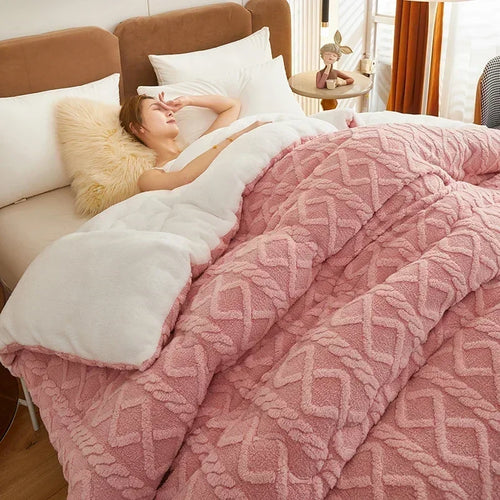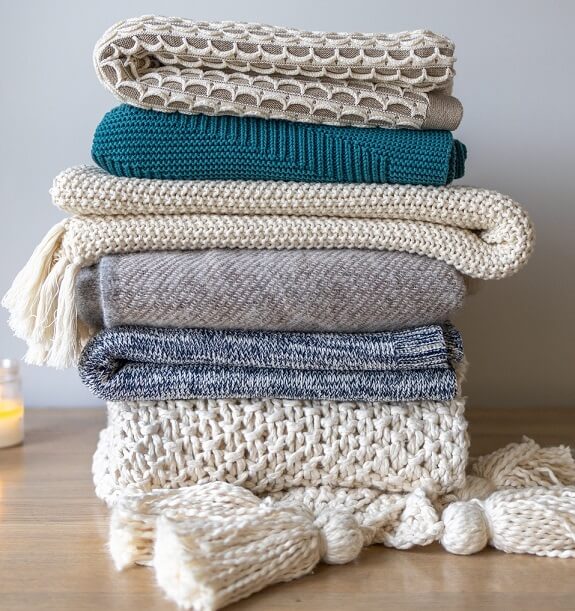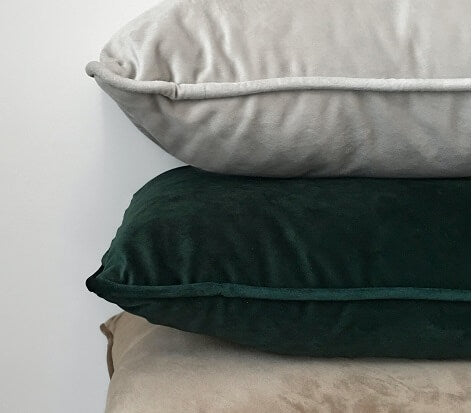One of the most exciting parts of preparing for a new baby is getting all the necessary supplies and items. And when it comes to blankets, it can be tempting to stock up on all the adorable and cozy options out there. But how many baby blankets do I need exactly? It's a common question that many soon-to-be parents ask, and the answer may surprise you. In this blog post, we'll take a realistic look at the number of baby blankets you actually need, so you can avoid unnecessary purchases and have just the right amount for your little one.
Understanding the Importance of Baby Blankets
Baby blankets are not just cute and cozy accessories for your little one. They serve a vital purpose in providing warmth, comfort, and security to your baby. Understanding the importance of baby blankets will help you make informed decisions about how many you actually need.
First and foremost, baby blankets help regulate your baby's body temperature. Newborns have a harder time regulating their body temperature, so a blanket can provide an extra layer of insulation to keep them warm and comfortable. Whether you're swaddling your baby, using a blanket for tummy time, or covering them in their crib, blankets help maintain the ideal body temperature for your little one.
In addition to warmth, baby blankets also offer a sense of security. Babies love the feeling of being wrapped up snugly in a blanket, mimicking the cozy environment of the womb. This sense of security can help soothe your baby and promote better sleep.
Furthermore, baby blankets can be multi-functional. They can be used as burp cloths, nursing covers, play mats, and even as makeshift changing pads in a pinch. Having a few extra blankets on hand can come in handy when unexpected situations arise.
However, it's important to note that safety should always be a priority when using baby blankets. Ensure that blankets are lightweight and breathable to prevent the risk of suffocation. Avoid using blankets with loose threads or embellishments that can pose a choking hazard.
Understanding the importance of baby blankets will help you make informed decisions about how many to purchase. Now, let's delve into the factors that can help you determine exactly how many baby blankets you need.

Evaluating Factors that Determine How Many Baby Blankets You Need
When it comes to determining how many baby blankets you need, there are several factors to consider. The number of blankets you will need can vary based on these factors, and it's important to evaluate each one before making a decision.
First and foremost, think about how often you plan on washing blankets. Babies are notorious for making messes, so it's likely that you'll be doing laundry quite frequently. If you're okay with washing blankets often, then you may be able to get away with having fewer of them. On the other hand, if you'd rather not have to constantly do laundry, having a larger number of blankets can be beneficial.
Next, think about the climate where you live. If you live in a colder area, you may need more blankets to keep your baby warm. On the other hand, if you live in a warmer climate, you may only need a few lightweight blankets for swaddling or for covering your baby during naps.
Consider your baby's sleeping habits as well. Some babies love to be swaddled tightly in a blanket while they sleep, while others prefer to sleep without being swaddled. If your baby enjoys being swaddled, having a few extra blankets on hand for this purpose is a good idea. However, if your baby doesn't like being swaddled or sleeps better without a blanket, you may not need as many.
Lastly, think about convenience and ease of use. If you plan on using baby blankets for multiple purposes, such as burp cloths or play mats, you may want to have a few extra on hand. This way, you won't have to constantly wash and reuse the same blanket for different purposes.
By evaluating these factors, you can determine exactly how many baby blankets you need. Remember, every baby is different, so what works for one may not work for another. Trust your instincts and do what feels right for you and your little one.
Recommended Number of Baby Blankets Based on Usage and Convenience
When it comes to determining the recommended number of baby blankets based on usage and convenience, there is no one-size-fits-all answer. However, there are some guidelines you can follow to ensure you have enough blankets to meet your baby's needs without going overboard.
First and foremost, consider your baby's age. Newborns tend to spit up and have diaper blowouts more frequently than older babies, so having a larger number of blankets can be helpful. Aim for around 5-7 lightweight receiving blankets in the early months to ensure you always have a clean one on hand.
As your baby grows, you may find that you need fewer blankets for everyday use. One or two larger blankets for tummy time, napping, or stroller outings should suffice. If you plan on using blankets for multiple purposes, such as burp cloths or nursing covers, having a few extras can be beneficial.
Next, think about convenience. Do you have access to laundry facilities at home? If so, you may be able to get away with fewer blankets and simply wash them more frequently. On the other hand, if you're relying on a laundromat or find yourself constantly running out of clean blankets, having a larger number can be more practical.
Consider the climate in your area as well. If you live in a colder climate, you may need more blankets to keep your baby warm and cozy. Conversely, if you live in a warmer climate, a few lightweight blankets for swaddling or covering during naps should suffice.
Lastly, trust your instincts and adjust accordingly. Every baby is different, and what works for one may not work for another. If you find that you need more blankets for your little one's comfort and security, don't hesitate to stock up. Likewise, if you feel like you have too many, don't be afraid to donate or pass them along to someone in need.
Remember, the goal is to have just the right amount of baby blankets to keep your little one comfortable, cozy, and safe. By considering factors such as your baby's age, convenience, climate, and personal preferences, you can determine the recommended number of baby blankets that work best for you and your baby.

Different Types of Baby Blankets and Their Purposes
When it comes to baby blankets, there is no shortage of options to choose from. From swaddle blankets to receiving blankets, it can be overwhelming to figure out which ones you actually need. Understanding the different types of baby blankets and their purposes can help you make informed decisions and ensure that you have the right ones for your little one.
Swaddle blankets are a popular choice for many parents. They are usually made of lightweight and breathable fabric, and their main purpose is to provide a snug and secure swaddle for your baby. Swaddling can help soothe your baby, promote better sleep, and prevent the startle reflex. Look for swaddle blankets that are easy to use and have adjustable fasteners or Velcro for a secure fit.
Receiving blankets are another essential type of baby blanket. They are versatile and can be used for various purposes, such as swaddling, burping, and providing a clean surface for diaper changes. Receiving blankets are typically made of soft and cozy fabric, and they come in various sizes and designs. Having a few receiving blankets on hand is always a good idea.
For colder climates or cooler months, consider investing in heavier blankets such as fleece or knit blankets. These blankets provide extra warmth and insulation for your baby and are perfect for tucking them in their crib or stroller during chilly outings.
Muslin blankets are another popular choice for many parents. They are lightweight, breathable, and perfect for warmer climates. Muslin blankets are also versatile and can be used for swaddling, as a nursing cover, or as a lightweight blanket for napping or tummy time.
Ultimately, the types of baby blankets you choose will depend on your personal preferences and the specific needs of your baby. Having a variety of blankets to cater to different situations and climates will ensure that you are prepared for any scenario. Remember to prioritize safety and opt for blankets that are lightweight, breathable, and free from any loose threads or embellishments that could pose a choking hazard.
FAQ
1. How many blankets do you need for a baby?
During the newborn stage, you can benefit from having around 6-12 receiving blankets and 2-4 swaddling blankets as your primary go-tos. These numbers can accommodate multiple changes throughout the day and offer ample backups for nighttime disruptions and laundering needs.
2. How many squares do you need to make a baby blanket?
Newborn Blanket:
Needs about 23 granny squares (5"x5" each).
3. Should a baby blanket be square or rectangle?
What to read next
 Snuggle Up in Style: Discover the Best Baby Onesie Brands for a Peaceful Night's Sleep
Snuggle Up in Style: Discover the Best Baby Onesie Brands for a Peaceful Night's Sleep
 Rest Easy on Your Travels with the Best Travel Pillow
Rest Easy on Your Travels with the Best Travel Pillow
 Sleep in Style: Discover the Best Women's Onesie Brands for Ultimate Comfort
Sleep in Style: Discover the Best Women's Onesie Brands for Ultimate Comfort
What to buy
Checkered Knit Baby Blanket
From: $38.95

Organic Snug Blanket - Cherry Blossom | Cozy, Breathable Baby Essential
From; $49.95

High End Thickened Winter Warm Blankets
From: $289.90







